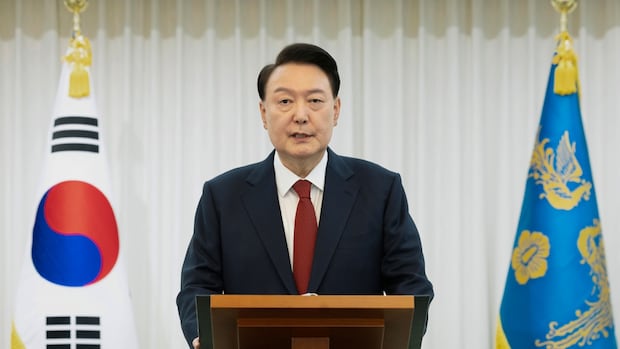Useful information
Prime News delivers timely, accurate news and insights on global events, politics, business, and technology
Useful information
Prime News delivers timely, accurate news and insights on global events, politics, business, and technology

South Korean law enforcement authorities are pushing to summon impeached President Yoon Suk Yeol for questioning over his brief martial law decree as the Constitutional Court began its first meeting on Monday on Yoon’s case to determine whether to remove him from office. charge or restore it.
A joint investigation team involving the police, an anti-graft agency and the Defense Ministry plans to send a request to Yoon’s office for him to appear for questioning on Wednesday, as they expand an investigation into whether his ill-conceived power grab amounted to to a rebellion.
Yoon was impeached on Saturday by the opposition-controlled National Assembly over his Dec. 3 martial law decree. His presidential powers will be suspended until the Constitutional Court decides whether to formally remove him from office or reinstate him. If Yoon is removed, elections must be held to choose his successor within 60 days.
Yoon has justified his application of martial law as a necessary act of government against an opposition he described as “anti-state forces” bogging down his agendas and vowed to “fight to the end” against efforts to remove him from office.
Hundreds of thousands of protesters have flooded the streets of the country’s capital, Seoul, in recent days, calling for Yoon’s ouster and arrest.
South Korea’s parliament voted Saturday to impeach President Yoon Suk Yeol over his brief martial law decree, a historic rebuke that was cheered by jubilant crowds who described the outcome as another challenging moment on the country’s resilient democratic path. nation.
It is not yet clear whether Yoon will grant investigators’ request for an interview. South Korean prosecutors, who are pushing for a separate investigation into the incident, also reportedly asked Yoon to appear at the prosecutor’s office for questioning on Sunday, but he refused to do so. Repeated calls to the Seoul prosecutor’s office went unanswered.
Yoon’s office has also resisted a police attempt to search the premises for evidence.
The request came before the Constitutional Court meets to discuss the case later on Monday. The court has up to 180 days to rule, but observers say a court ruling could come sooner.
In the case of the parliamentary impeachments of previous presidents (Roh Moo-hyun in 2004 and Park Geun-hye in 2016), the court spent 63 days and 91 days, respectively, before determining to reinstate Roh and remove Park.
In the last 24 hours, South Korean President Yoon Suk Yeol declared martial law, but his decision was unanimously rejected by parliamentary vote. Andrew Chang explains the turmoil the president’s statement sparked and what it says about the state of South Korean politics. Images provided by Reuters and Getty Images.
Prime Minister Han Duck-soo, who will serve as the country’s interim leader while Yoon’s powers are suspended, and other government officials have sought to reassure allies and markets after Yoon’s surprise stunt paralyzed politics, halt high-level diplomacy and complicate efforts to revive a faltering economy.
Liberal opposition leader Lee Jae-myung, whose Democratic Party has a majority in the National Assembly, urged the Constitutional Court to rule quickly on Yoon’s impeachment and proposed a special council for political cooperation between the government and parliament.
Lee, a firebrand lawmaker who for years led a political offensive against Yoon’s government, is seen as the favorite to replace him. He lost the 2022 presidential election to Yoon by a very narrow margin.

Kweon Seong-dong, parliamentary leader of Yoon’s conservative People Power Party, separately criticized Lee’s proposal, saying it is “not right” for the opposition party to act as the ruling party.
Yoon’s ouster, which was supported in parliament by some of the ruling People Power Party’s lawmakers, has created a deep rift within the party between Yoon’s loyalists and his opponents. On Monday, PPP Chairman Han Dong-hun, a strong critic of Yoon’s martial law, announced his resignation.
“If martial law had not been lifted that night, a bloody incident could have broken out that morning between citizens who would have taken to the streets and our young soldiers,” Han said at a news conference.
Yoon’s imposition of martial law on December 3, the first of its kind in more than four decades, harkens back to an era of authoritarian leaders the country had not seen since the 1980s. Yoon was forced to lift his decree hours later, after parliament voted unanimously to revoke it.
Yoon sent hundreds of troops and police to parliament in an effort to stop the vote, but they withdrew after parliament rejected Yoon’s decree. No major acts of violence occurred.
Opposition parties have accused Yoon of rebellion, saying a president in South Korea can declare martial law only during times of war or similar emergencies and would have no right to suspend parliament operations even in those cases.